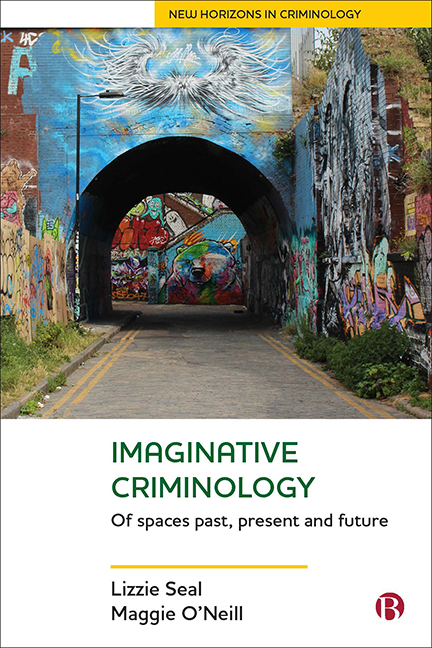Book contents
- Frontmatter
- Contents
- List of figures and tables
- Preface
- 1 Imaginative Criminologies of Space: the Spaces of Imaginative Criminology
- 2 Historical Spaces of Confinement 1: Homes for Indigenous Children in Australia
- 3 Historical Spaces of Confinement 2: Magdalene Laundries
- 4 Creative Writing and the Imagined Spaces of Imprisonment
- 5 Border Spaces and Places: the Age of the Camps
- 6 Imagining Spaces of Violence and Transgression in Vancouver and Northern Ireland
- 7 Imagining Dystopian Futures in Young Adult Fiction
- 8 Conclusion
- References
- Index
Preface
Published online by Cambridge University Press: 30 April 2022
- Frontmatter
- Contents
- List of figures and tables
- Preface
- 1 Imaginative Criminologies of Space: the Spaces of Imaginative Criminology
- 2 Historical Spaces of Confinement 1: Homes for Indigenous Children in Australia
- 3 Historical Spaces of Confinement 2: Magdalene Laundries
- 4 Creative Writing and the Imagined Spaces of Imprisonment
- 5 Border Spaces and Places: the Age of the Camps
- 6 Imagining Spaces of Violence and Transgression in Vancouver and Northern Ireland
- 7 Imagining Dystopian Futures in Young Adult Fiction
- 8 Conclusion
- References
- Index
Summary
Books in the New Horizons in Criminology series are by leading authors and reflect cutting-edge thought and theoretical developments in criminology. As an editor I want to attract authors who are doing work that is exciting and creating genuinely new horizons for criminology. Lizzie Seal and Maggie O’Neill are two authors that I admire, and I have been keen for them to be involved in the series in some way. That they chose to write this book together is a bonus! Maggie is known for important work with asylum seekers and sex workers, especially that which employs participatory and artsbased research methods – in particular, ethno-mimesis and walking methods (e.g. O’Neill and Hubbard, 2010). Lizzie's work is equally groundbreaking, especially her historical work on women who kill (2010) and capital punishment (2015). Seal and O’Neill have worked together before, and in their previous collaboration (O’Neill and Seal, 2012) they drew on cultural criminology to explore portrayals of transgression, subversion of these portrayals and the possibility of resistance. In this new book they take this further by suggesting an imaginative criminology that also considers the spatiality of transgression. Their focus is on ‘spaces and places of transgression as lived, portrayed and imagined’.
For Seal and O’Neill, the book's aim is ‘to argue for and do imaginative criminology’. Drawing inspiration from Mills’ (1959) ‘sociological imagination’, the authors see imaginative criminology as bringing attention to social structure, place in history, the biographical and experiential. Seal and O’Neill use an array of imaginative methodologies to make this possible. Examples are from real life and fiction, including spaces of confinement, liminal spaces of borders and dystopian spaces of fiction. Oral histories are seen alongside cultural representations to explore how specific spaces and places are ‘remembered as sites of transgression, exclusion, resistance and possibility’. One example is Australia's ‘stolen generations’, the removal of Indigenous children from their families between 1910 and 1970. The authors consider how this is remembered and culturally represented – for instance, through the book Follow the Rabbit Proof Fence and the film Rabbit Proof Fence. The authors also look at the Magdalene Laundries in Ireland, which housed poor and ‘deviant’ young women, including how they have been portrayed in documentary and in films such as ‘Philomena’.
- Type
- Chapter
- Information
- Imaginative CriminologyOf Spaces Past, Present and Future, pp. v - viiiPublisher: Bristol University PressPrint publication year: 2019



